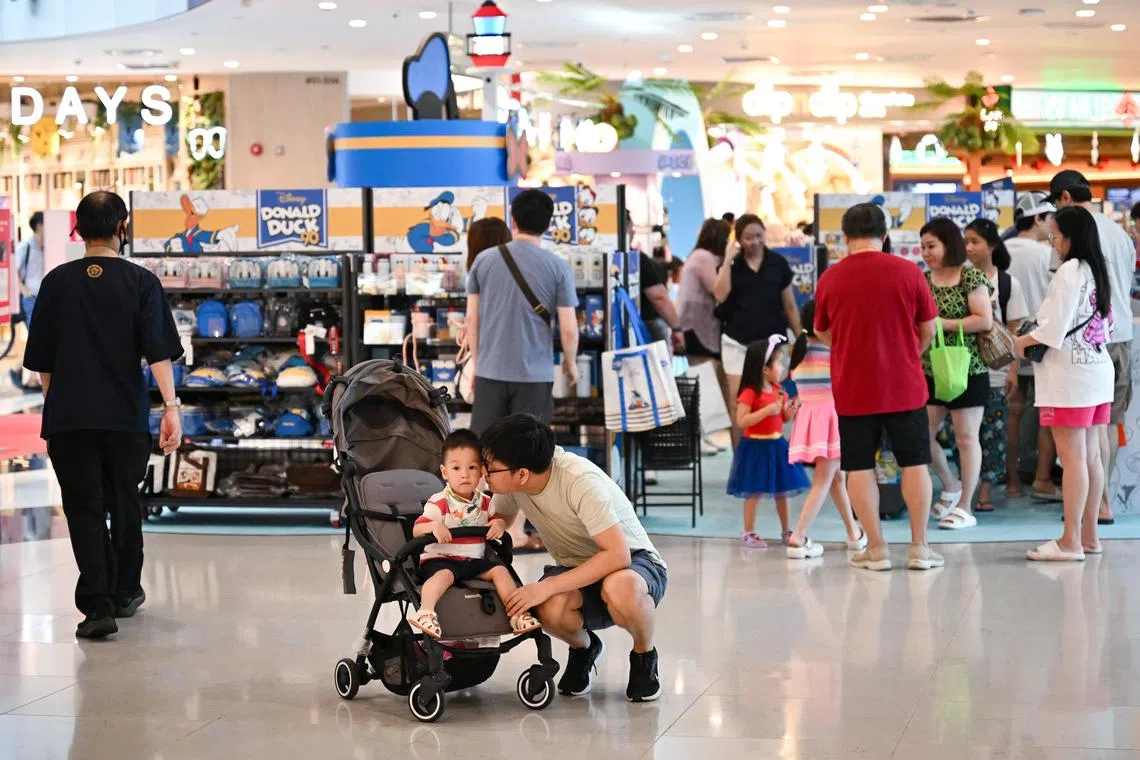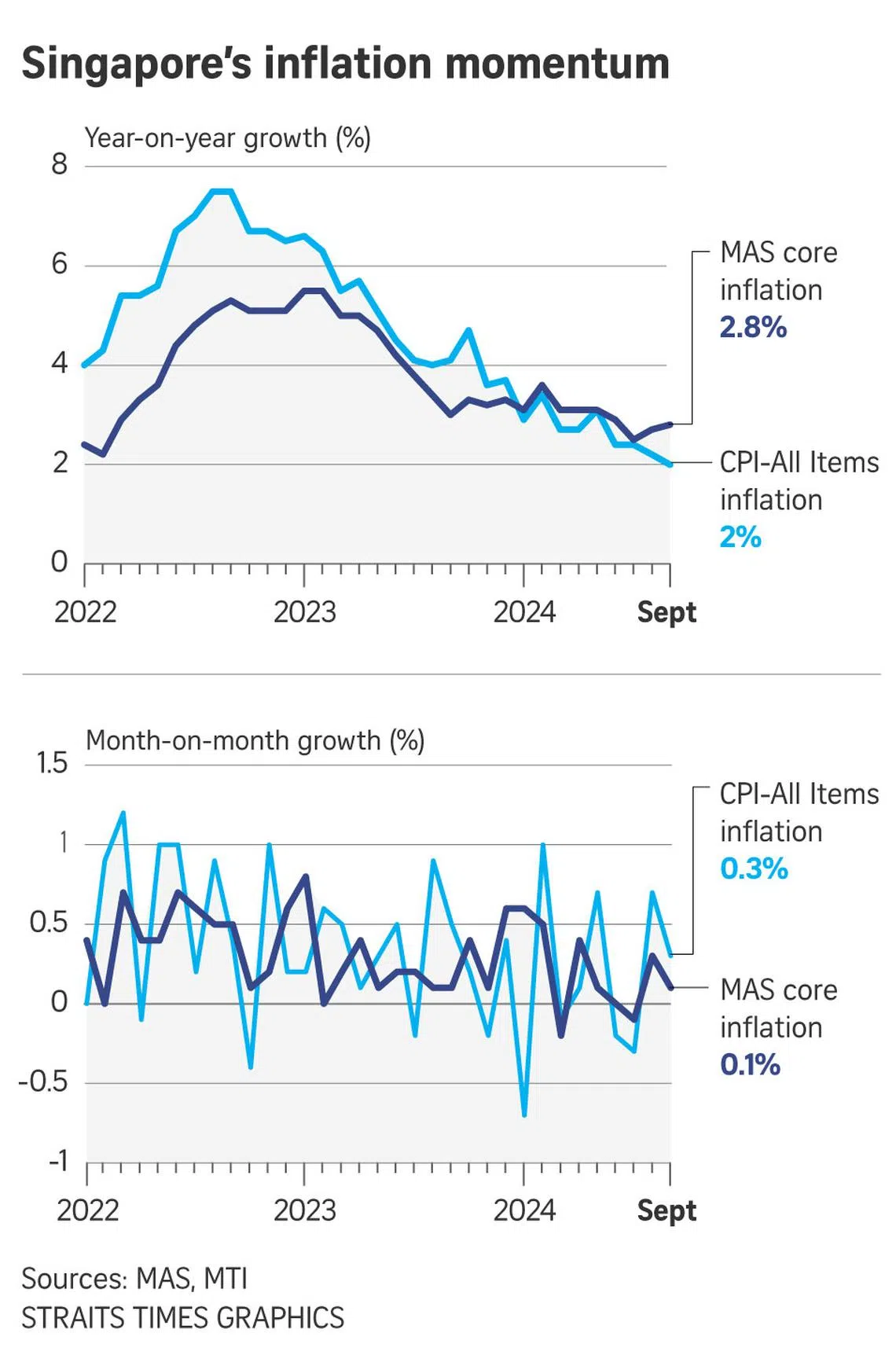Singapore core inflation up for second straight month to 2.8% in September
Sign up now: Get ST's newsletters delivered to your inbox

September’s increase was due to higher inflation for retail and other goods due to a smaller decline in clothing and footwear prices.
ST PHOTO: LIM YAOHUI
SINGAPORE - Singapore’s key consumer prices rose slightly faster than expected in September, with core inflation climbing for the second straight month, official data showed on Oct 23.
Despite the past two months’ rise in core inflation, the Monetary Authority of Singapore (MAS) and the Ministry of Trade and Industry (MTI) still expect it to stay on a gradual moderating trend and reach around 2 per cent by the year end. It is a target that some economists say “looks ambitious”, with only three more months to go.
In September, core inflation, which excludes private transport and accommodation costs to better reflect the expenses of households, edged up to 2.8 per cent year on year. This is higher than the 2.7 per cent forecast by economists in a Reuters poll, which was also the rate in August.
It comes after core inflation dropped to 2.5 per cent in July, the lowest level in over two years.
September’s increase was due to higher inflation for retail and other goods due to a smaller decline in clothing and footwear prices.
Overall, or headline, inflation eased to 2 per cent year on year in September, from 2.2 per cent in August. The headline figure was, however, higher than the 1.9 per cent forecast in the Reuters poll.
DBS Bank economist Chua Han Teng said this is the slowest rate of price increase in overall inflation since March 2021.
It came as private transport costs fell 2.4 per cent, sharper than their 1 per cent drop in August, and lower petrol prices. Accommodation inflation, meanwhile, cooled because of a smaller increase in housing rents.
Services inflation was unchanged at 3.3 per cent as a fall in telco fees was offset by a bigger increase in tuition and other fees, holiday expenses and health insurance costs.
Food inflation moderated to 2.6 per cent as an uptick in non-cooked food costs was offset by slower inflation in the cost of prepared meals.
On a month-on-month basis in September, core inflation eased to 0.1 per cent while overall inflation slowed to 0.3 per cent. This contrasts with August, where core inflation was 0.3 per cent and overall inflation was 0.7 per cent.
Maybank economists Chua Hak Bin and Brian Lee noted that core inflation was sticky over the past two months, deviating from the “gradual moderating trend” towards 2 per cent that the MAS projects by the end of 2024.
They said that the hike in the local qualifying salary (LQS) in July may add to wage costs, which could subsequently be passed on to consumers. The LQS is the minimum salary that employers hiring foreign workers need to pay their local workers.
Coupled with a strengthening economy and a tight labour market, inflation may remain stubborn, they added. Maybank is sticking to its forecasts for core inflation to average 2.8 per cent in 2024 and end the year at around 2.5 per cent, above the MAS guidance of 2 per cent.
As for DBS Bank, Mr Chua noted that for the third quarter of 2024, core inflation averaged 2.7 per cent, lower than 3 per cent in the previous quarter.
He believes the underlying disinflation trend remains intact for the rest of the year and expects core inflation to be on track to meet MAS’ projection of averaging 2.5 per cent to 3 per cent in 2024.
MAS and MTI laid out several factors in favour of inflation heading lower. For one thing, while global energy prices have been volatile recently, they remained below the levels a year ago.
Singapore’s imported inflation of manufactured goods has continued to be on a broad decline, they noted, adding that the gradually strengthening Singapore dollar should continue to curb imported inflation.

MAS on Oct 14 had kept unchanged its monetary policy stance
The September data showed services inflation continued to moderate and should ease further over the rest of 2024, said MAS and MTI.
Domestic cost increases are expected to cool as nominal wage growth moderates and productivity improves. Previous increases in labour costs have also largely peaked, they added.
UOB economist Jester Koh noted that the adoption of generative-AI related applications could reduce manual work and make business processes more efficient, boosting labour productivity further.
Heading into 2025, accommodation inflation should come in lower as leasing demand moderates. This should partly offset an anticipated pickup in private transport inflation amid still-firm demand for cars, MAS and MTI noted.
Taking all these factors into account, overall inflation is expected to come in at around 2.5 per cent for the whole of 2024 and average 1.5 per cent to 2.5 per cent in 2025, they said.



